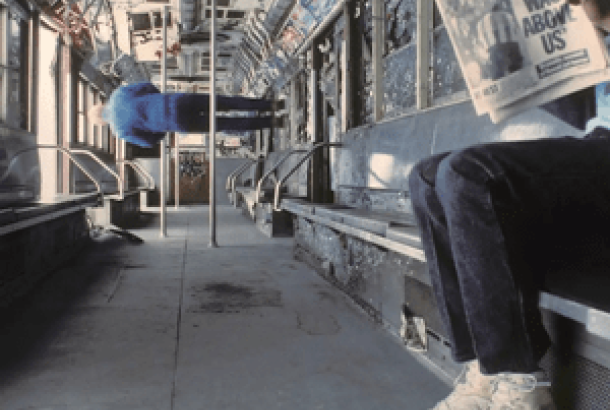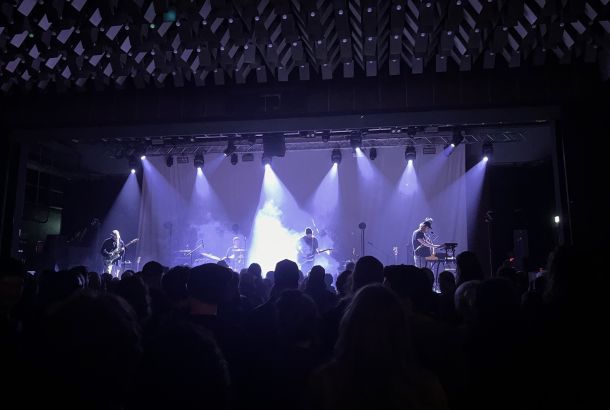Interview: These New Puritans
These New Puritans cannot be second guessed. Starting as a fourpiece band, they drew influence from hiphop and electronica. Now, with their latest album, Field of Reeds, they are classical sounding, with flowing melodies, and an added brass section. This unpredictability has made them one of the most revered young bands in Britain. They also have a reputation as enigmatic interviewee’s, but this was not the case when I spoke with lead singer and bassist, Jack Barnett,to discuss how he went about evolving his band, what he liked most about the new direction, and his quirky inspirations.
Despite the development of their sound, not much has changed for Barnett. For him, the new songs involved “a return to how I used to write when I was a kid… when I was 8 or 9 I’d come home from school and write songs on my guitar just for fun, purely for fun.”
Asked of how he decided on the new classical outlook to These New Puritans, Barnett was deadpan. “I just sat and wrote stuff. There were about 50 things that could have been on the album. Some of them were fragments, some were finished.”
But how did he decide on the variety of sounds he used? “It’s whatever the song demands. When I’m writing a song, it will just be made up of different instruments and sounds, that’s how the songs come to me. Obviously people focus on things like the hawk, but that’s just because the song demanded that, it’s a musical part. He then divulged, “the motivation with this record was just doing whatever was the most fun; being guided by your instincts kind of thing.” Due to the harmonic depth of the new album, this was hard to fathom, but Barnett explained, “you could play all these songs on piano, if you wanted to”.
When it comes to deciding how to arrange his songs live, however, much more attention to detail is applied. “It will take me weeks adapting the songs to new instruments. Then me and Tom [Hein] will work on the electronic sounds involved. At the moment he’s using a load of stuff, including an Akai z8, an old hardware sampler. It’s obsolete technology but it suits us really well.”
So Jack has retained a made-in-the-bedroom mentality to making music, but he has made this unnoticeable live. “Right now we have a 7 piece band; trumpet, French horn, piano, Elisa [Rodrigues], Tom on electronics, and George [Barnett, Jack’s twin brother] on drums and vibraphone” he said. “Oh, and me. It’s good not too big, not too small. It’s agile but we can still make a big sound. It’s perfect.” The added timbre hasn’t increased stress on Jack, thanks to the benefits of the new band members, especially esteemed Jazz singer Elisa Rodrigues, alongside him. “I enjoy singing live now too because now that Elisa is doing 50% I can focus on my 50% and not try and do everything. I just do what I do. It’s great singing with someone else, suddenly everything slots into place. You get to specialise a bit.” The increased complexity of their sound has, in fact, made Jack’s job easier, more refined. It is possible to get the impression of These New Puritans as something of a one man band, with all ideas flowing from Jack, but he was quick to point the value of the rest of his collective, “some top musicians, …I really love this band at the moment”.
I then told Barnett that I thought Field of Reeds deserved a Mercury Award nomination, which it didn’t get. “Thanks. I’m fine with it; you win some you lose some. It’s not something that if I was just a music consumer, rather than a musician, I would pay a huge amount of attention to.” Jack was also magnanimous when I asked him his views on the state of British music, he explained “it’s not something I think about too much; I’m part of the tradesman’s class, I’m basically the worker, not the theoretician. I just write songs, try to make them sound good and hope people get something from them.” It is this edge that sets These New Puritans aside, as a band that have a clear direction, who were never going to get second-album-syndrome, because, despite maturing their sound and enjoying success, Barnett hasn’t forgotten why he started making music in the first place.
Towards the end of the interview, we got talking about some of his contemporary, and classic, favourites: ‘East India Youth, he’s good, he supported us on a few shows of our UK tour. Good melodies and stuff.’, and, surprisingly, “Captain Beefheart and the Magic Band. I grew up learning those songs.’ And what was the most distinctive moment of his musical upbringing? ‘A rerun of Sparks playing ‘This Town Ain’t Big Enough For The Both Of Us’ on Top of the Pops. Ron Mael is a comedy genius.” These New Puritan’s unpredictability is left intact.







